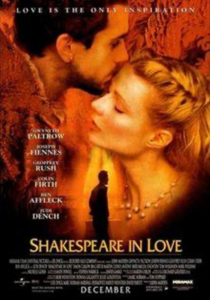
Shakespeare in Love (1998)
Directed by John Madden
Starring Gwyneth Paltrow, Joseph Fiennes, Judi Dench, and Geoffrey Rush
As I said above, Hamnet is, a part, an imaginary account of how Shakespeare came to write Hamlet. The Book was very good. And so, after finishing it, I felt I needed more. And I knew just the thing. A movie that I’d be watching for the second time.
Shakespeare in Love is an imaginary account of how the bard dreamed up the plot of Romeo and Juliet, his best-loved play.
I don’t know if I’d call it a historical romance or a comedic period piece. It has all of those elements and a bit of action, too.
Something I most liked about it when I first saw Shakespeare in Love was the trope of including historical people in the movie that weren’t a necessary part of the plot, but added some fun for anyone that had a passing knowledge of the theater scene in Elizabethan England.
For example, without comment, the movie demonstrated the political and commercial challenges of running a theater in England at that time, the custom of using an all-male cast and pre-pubescent boys to play female parts, the fact that Shakespeare and the other great playwrights of his time routinely acted in one another’s plays to make ends meet – not to mention the above-referenced theory that Shakespeare didn’t write his own stuff. This is brilliantly depicted by having his friend, Christopher Marlowe, frequently give Shakespeare tips on plot twists and even the naming of Romeo and Juliet.
There is also a wonderful character – a young boy that hangs around the theater catching rats – who, though never named, seemed to be the childhood version of Thomas Kyd, a playwright that was active a generation after Shakespeare and whose plays were known for being dark and even macabre.
I remembered, too, how much I liked the script when I first saw the movie. The wit and beauty of the language, and the ingenious way Marc Norman and Tom Stoppard wove into the dialog so many phrases that we know from Shakespeare’s plays.
I’m happy to report that these rewards were still available to me in this second watching. In some ways, I enjoyed them even more.
One problem: I couldn’t so much enjoy the plot as I had the first time.
This second time around, I couldn’t sympathize as much with the character of Shakespeare and enjoy as much the relationship he had with the Gwyneth Paltrow character.
And that was because, having just read Hamnet, I had become a big fan of Agnes, Shakespeare’s amazing wife, who was back in Stratford, taking care of the kids, as well as making extra money on the side, while her husband, the great bard, was philandering in London!
What You Will Like About Shakespeare in Love – Even the Second Time Around
The script, as I said, is wonderful.
The acting is good, but understandably theatrical.
The scenes, cinematography, and direction are all very good.
The plot is smart and the action is compelling.
And Gwyneth Paltrow is amazing – her stage presence, her acting, and her beauty.
I’ve sometimes wondered if every beautiful actress hasn’t had a film in which, as a young woman, she was at her most stunning. Like Cybill Shepherd in The Last Picture Show. Like Elizabeth Taylor in Cleopatra. Like Marilyn Monroe in The Seven Year Itch. For Gwyneth Paltrow, it could be Shakespeare in Love.
Interesting Facts
* Shakespeare in Love won the Academy Award for Best Picture. And despite being on screen for only about 8 minutes, Dame Judi Dench’s portrayal of Queen Elizabeth won her the Oscar for Best Supporting Actress – her only win in seven nominations.
* In the movie, Will writes Sonnet 18 (“Shall I compare thee to a summer’s day”) for Viola. In reality, Shakespeare addressed it (and all of the first 126 sonnets) not to a woman but to a “Fair Youth.”
Critical Reviews
* “You can’t miss with a movie that speaks the language of love with such hotblooded delight. And in iambic pentameter, too.” (Rolling Stone)
* “Gwyneth Paltrow, in her first great, fully realized starring performance, makes a heroine so breathtaking that she seems utterly plausible as the playwright’s guiding light.” (New York Times)
* “Scene after scene engages us as cheerful groundlings, tosses us jokes, toys with our expectations, then sweeps away the boundaries between film and stage, comedy and tragedy so we’re open to the power of language and the feelings behind it.” (Wall Street Journal)
